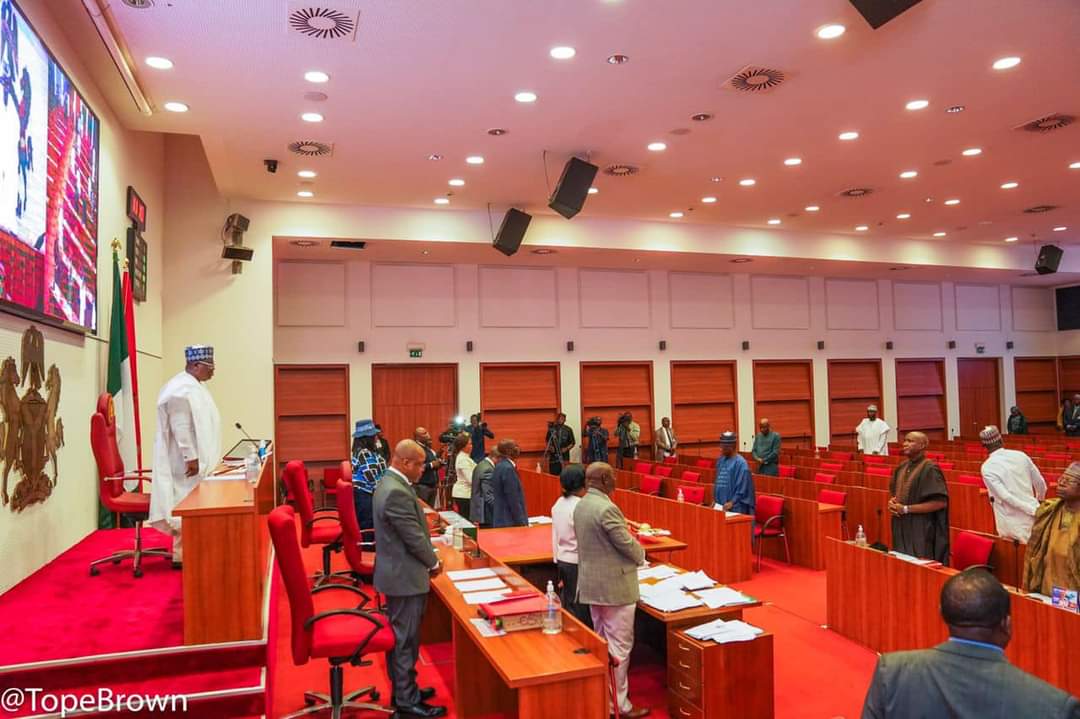Business
Group Slams NASS For Raising Nigerians’ Tax Burden

The Centre for the Promotion of Private Enterprise (CPPE) has slammed the National Assembly for hurriedly passing the 2022 finance bill without the benefit of input from citizens who they were elected to represent.
Chief Executive Officer (CEO) of CPPE, Dr Muda Yusuf, who stated the displeasure of the CPPE over the hurried passage of the bill, said the act raises key questions.
“The Centre is disturbed by the rushed passage of the 2022 Finance Bill by the National Assembly. It calls to question the representation role of the Assembly. There was practically no room for public hearing and engagement with stakeholders in the consideration of the bill”, he said.
According to him, “this is a major let down by the National Assembly in its representation role in our democracy. The action is not consistent with the ideals and principles of our democracy because sovereignty belongs ultimately to the people.
“What the National Assembly has done is tantamount to disrespect, disregard and contempt of the Nigerian people and the business community”, he srated.
The Bill that has been passed contained the following provisions, among others: “imposition of excise duties on all services with rates to be determined by a presidential order; imposition of 0.5 per cent tax on all eligible imports from non-African countries to fund Nigeria obligations to international organisations; and an increase in Tertiary Education Tax from 2.5 per cent to three per cent of company profit”, Yusuf said.
Dr Yusuf, therefore, called on the President to withhold assent on the 2022 Finance Bill until the National Assembly properly engages stakeholders as required by legislative protocols.
He noted that “this is a piece of legislation which has profound implications for investment, citizens welfare and the Nigeria economy. It is curious and puzzling that the stenate gave just 24 hours’ notice for stakeholders to attend a public hearing on the bill”.
The CEO continued that, “the public notice was published on December 21, 2022 for a public hearing scheduled for December 22, 2022. There is no better expression of deliberate exclusion of stakeholders from this important legislative process.
“The House of Representatives gave a more generous notice of about three weeks. But in a sudden and baffling twist of events, the House passed the bill before the date of the advertised public hearing which was January 13, 2023. The bill has since been forwarded to the President for assent. This haste is incomprehensible.
“It is regrettable that National Assembly hurriedly passed the bill without the benefit of input from citizens whom they were elected to represent.
“This is a major letdown by the National Assembly in its representation role in our democracy. The action is not consistent with the ideals and principles of our democracy because sovereignty belongs ultimately to the people”, he stated.
He said that all of these have far-reaching implications for investors and citizens, saying that it will affect the cost of production and will affect operating cost and would undermine investors’ confidence.
Yusuf also said it has profound inflationary implications, because it will effectively move corporate tax to almost 35 per cent which is one of the highest globally.
He appealled to President Mohammadu Buhari not to leave a legacy of unbearable tax burden for investors in the Nigerian economy, adding that the torrent of taxes, levies, fees is already crippling business.
Business
Agency Gives Insight Into Its Inspection, Monitoring Operations

Business
BVN Enrolments Rise 6% To 67.8m In 2025 — NIBSS

The Nigeria Inter-Bank Settlement System (NIBSS) has said that Bank Verification Number (BVN) enrolments rose by 6.8 per cent year-on-year to 67.8 million as at December 2025, up from 63.5 million recorded in the corresponding period of 2024.
In a statement published on its website, NIBSS attributed the growth to stronger policy enforcement by the Central Bank of Nigeria (CBN) and the expansion of diaspora enrolment initiatives.
NIBSS noted that the expansion reinforces the BVN system’s central role in Nigeria’s financial inclusion drive and digital identity framework.
Another major driver, the statement said, was the rollout of the Non-Resident Bank Verification Number (NRBVN) initiative, which allows Nigerians in the diaspora to obtain a BVN remotely without physical presence in the country.
A five-year analysis by NIBSS showed consistent growth in BVN enrolments, rising from 51.9 million in 2021 to 56.0 million in 2022, 60.1 million in 2023, 63.5 million in 2024 and 67.8 million by December 2025. The steady increase reflects stronger compliance with biometric identity requirements and improved coverage of the national banking identity system.
However, NIBSS noted that BVN enrolments still lag the total number of active bank accounts, which exceeded 320 million as of March 2025.
The gap, it explained, is largely due to multiple bank accounts linked to single BVNs, as well as customers yet to complete enrolment, despite the progress recorded.
Business
AFAN Unveils Plans To Boost Food Production In 2026
-

 News3 days ago
News3 days agoOji Clears Air On Appointment Of 15 Special Advisers By Fubara
-

 News3 days ago
News3 days agoNigeria Has Woken Up From Slumber Under Tinubu – Shettima
-

 Featured3 days ago
Featured3 days agoRivers: Impeachment Moves Against Fubara, Deputy Hits Rock …As CJ Declines Setting Up Panel
-
News3 days ago
Nigeria To Begin Exporting Urea In 2028 -NMDPRA
-
City Crime3 days ago
Health Commissioner Extols Fubara’s Commitment To Community Healthcare Delivery
-
Niger Delta3 days ago
Tinubu, Leading Nigeria To Sustainable Future – Okowa … Lauds Oborevwori Over Uromi Junction Flyover Construction
-
News3 days ago
US – Nigeria Security Engagement Translating Into Tangible Operational Gains – NSA
-

 News3 days ago
News3 days agoKing Jaja Impacted Beyond Rivers -Deputy Gov

